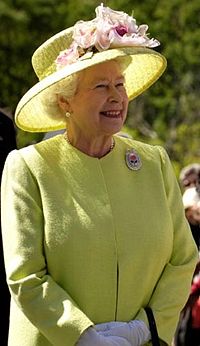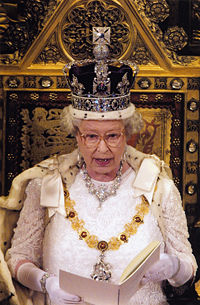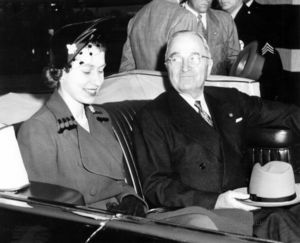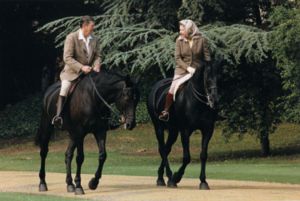Elizabeth II

Queen Elizabeth II meeting NASA staff at the Goddard Space Flight Center, Maryland, in 2007.
Elizabeth II (born 21 April[1] 1926) is the current Head of State and monarch of the United Kingdom and Supreme Governor of the Church of England.

The monarch visits Parliament annually in a ceremony to begin parliamentary proceedings. During this State Opening of Parliament, the Queen's Speech sets out her government's intentions for the coming year.
She is also Head of State of 14 other Commonwealth countries, including Canada, Australia and New Zealand, serving over 129 million people in these 'Commonwealth realms' as their sovereign and serving as titular Head of the Commonwealth for 39 other countries.[2] In none of these offices does she hold any real political power: as Head of State, the monarch's role is largely ceremonial as in all constitutional monarchies. Nevertheless, doubts remain in some quarters about specific residual discretions and crown prerogatives, such as choosing a prime minister, that are not always constrained by precedent or constitutional limitations.
The future Queen married Philip Mountbatten, whom the King had immediately before created Duke of Edinburgh, in 1947. Elizabeth ascended to the throne in 1952 while she was in Kenya,[3] upon the death of George VI, her father. Charles, Prince of Wales, the eldest of the Queen's four children, is expected to succeed her. Elizabeth's hobbies include watching horse racing and breeding thoroughbreds, dog walking and country dancing.[4]
Since overtaking the late King Rama IX of Thailand in 2022, the Queen is the second-longest-reigning sovereign in recorded history, behind only Louis XIV. (Only monarchs of officially independent states count in this statement, and only those whose reign length, not just existence, is reliably recorded.)
She has had 14 different Prime ministers, equalling George III's record.

Early life
Her Royal Highness Princess Elizabeth of York was the firstborn child of the Duke and Duchess of York. Her baptismal name was Elizabeth Alexandra Mary and her pet name was Lilibet. Her only sibling was a younger sister, the late Princess Margaret Rose. Because her father was the second son of the reigning monarch, he was not expected to succeed to the throne and so no one envisioned Princess Elizabeth as the future queen.
Princesses Elizabeth and Margaret Rose [5] are thought to have had a happy childhood. They were educated at home by a governess, Marion Crawford, and were close to their parents.
In 1936, following the abdication of Edward VIII, later the Duke of Windsor, Elizabeth’s father the Duke of York became King George VI. The princess was now HRH The Princess Elizabeth and heiress presumptive to the throne [6]
Accession to the throne
The Queen's accession actually took place in Kenya, where she happened to be visiting when her father died on 6 February 1952. A coded message was telegraphed through, and her private secretary asked her husband to break the news. The secretary then asked her what name she wished to reign under. The remaining legal formalities were carried out in London, partly immediately and partly when the Queen returned. She was crowned the following year as Queen of the United Kingdom, Canada, Australia, New Zealand, South Africa, Pakistan and Ceylon.
Reign of Elizabeth
The Queen is known to be a practising Christian, regularly attending Anglican church services (or Presbyterian ones when in Scotland), in addition to her titular role as Supreme Governor of the Church.
Footnotes
- ↑ April often being a poor month for weather, the Queen's birthday is officially celebrated in June. See the British monarchy's official page: 'One Queen, Two Birthdays'.
- ↑ [1]
- ↑ The last monarch to succeed while ouside the realm had been George I in 1714.
- ↑ The Royal Family: 'Her Majesty the Queen'. Official website.
- ↑ The Queen's sister was known as Princess Margaret Rose when young, and was styled HRH The Princess Margaret upon her father's accession to the throne.
- ↑ Had the princess been a boy, her title would have been heir apparent, but as King George's consort HM Queen Elizabeth was young enough potentially to have additional children, Elizabeth was heiress presumptive, because a brother would have been placed ahead of her in the line of succession.
See also
